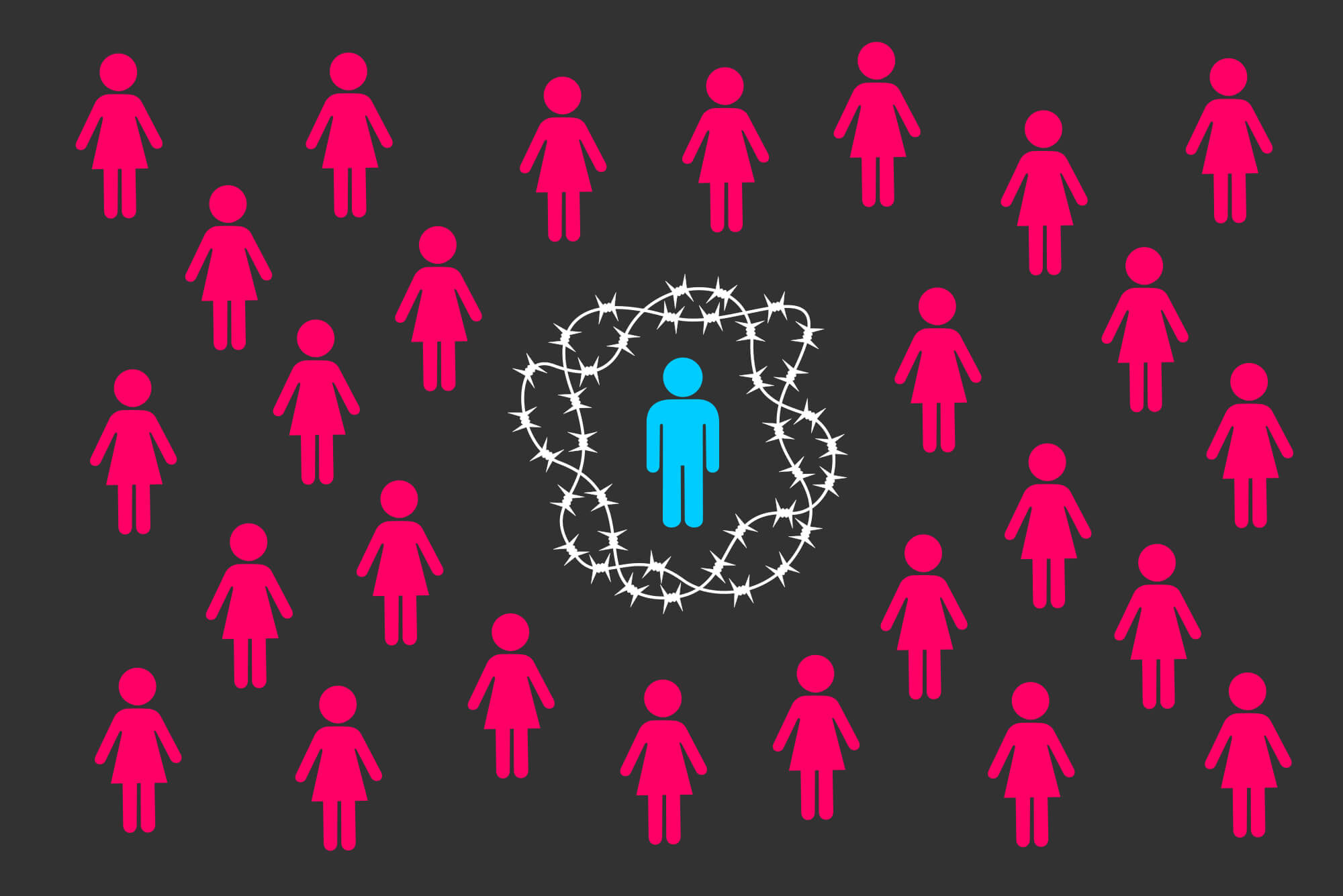INCELS: an Extremist Ideology?

In this article, Sara Rawnsley explores the term 'incels' or 'involuntarily celibate' movement, an online subculture in which a misogynistic worldview is promoted by individuals who blame women for their lack of sexual activity and shares her guidance for schools.
What is Incel philosophy and ideology?
Incel philosophy centres on an understanding of society as a hierarchy, where one's place is determined by appearance. Incels perceive themselves to be 'stuck' at the bottom of this hierarchy, whereas women are viewed as 'sexual gatekeepers' who make dating decisions based on attractiveness, height, weight, ethnicity and wealth.
They believe that the most attractive, idealised men ('Chads') attract the most attractive women ('Stacys'), leaving the less attractive women for men residing in the middle of the hierarchy ('normies') and none for the incels. Incels blame women for their lack of sexual experience, providing the basis for their misogyny.
Increase of misogynistic violent references and links with far right
Every day, almost 1,000 references to misogynistic or violent action are recorded in the 'incelosphere, sometimes called the 'manosphere' as the toxic prevalence of male supremacist content continues to intensify. This is eight times higher than in 2016, when researchers first began tracking misogynist content on the internet.
According to academics from the University of Exeter, there is an increasing overlap between incel followers and the far right, with online algorithms pushing young boys towards these extreme right-wing and misogynistic ideologies.
Lewys Brace, a Senior Lecturer in Computational Social Science and part of the University of Exeter's Q-Step Centre specialising in data science, extremism, terrorism, cybercrime, and Open-Source Intelligence (OSINT), led a long-term study that recorded, on average, 112 references a day to extreme misogynistic terms along with words 'punch, stab, shoot, attack' in 2016 on dedicated incel forums. He stated that;
“The incelosphere is definitely growing and diversifying and has increased in the toxicity of its discussions since 2016. The cross-pollination of ideologies is helping to drive this.”
Brace singles out YouTube stating that the algorithms that drive content recommendations, have in the past, pushed users "towards increasingly extreme content; particularly in the case of anti-woman/feminist content." YouTube refute this saying its recommendation system is designed to limit the spread of harmful misinformation and point people to authoritative sources.
Police figures released on June 22, reveal that more under-18s were arrested in the 12 months to March 2022 than in any other year. Senior Counter Terrorism officers say the upward trend in youth arrests is 'of real concern.' The latest Home Office figures relating to the police's use of powers under the Terrorism Act 2000 show that there were 196 arrests for terrorist-related activity between March 2021 and March 2022. Of those arrested, 15% were aged 18 or under, which equates to 29 teenagers being detained for suspected terrorist offences. In the year to March 2021, this figure was 12%.
Understanding and identifying radicalisation risk in your education setting
The Department for Education published guidance on 24 October 2022, Understanding and identifying radicalisation risk in your education setting". This guidance refers to incels in the section on Mixed, unclear or unstable cases (MUU) stating:
“Some children, young people and adult learners may appear engaged with, or have adopted, a mixed, unclear, or unstable ideology that supports extreme violence. They target a 'perceived other' of some kind (perhaps based on gender or another protected characteristic), but do not otherwise identify with one particular terrorist ideology or cause – for example, involuntary celibates (incels) who direct their anger mainly at women.”
The Prevent programme does not publish statistics related directly to incels as they are categorised as an ideology within the "mixed, unstable or unclear cases (MUU)." Almost a third of cases that were escalated to the UK's Channel programme, which provides tailored support to people deemed vulnerable to being drawn into terrorism, were individuals categorised as MUU.
Jonathan Hall KC, the independent reviewer of terrorism legislation, believes that the old-school approach to tackling terrorist offending needs to be reformed in the case of children stating,
“This discrepancy between numbers of arrests and sentences of imprisonment shows that the traditional method of prosecution, conviction and incarceration as a way of managing terrorist risk is no longer in play.”
Hall also stressed that, increasingly, a distinction needs to be made between terrorism and something falling short of terrorism, which could be described as extremism.
“Although we have to be careful about trying to codify extremism because, as has been found time and time again, extremism is a concept without natural boundaries.”
Growing concerns in schools
There is, undoubtedly, an ever-growing concern amongst teaching staff as to the increasing prevalence of misogynistic attitudes among boys. This is due to hugely popular online figures such as Andrew Tate, who has recently been arrested, with his brother, in Romania, as part of an investigation into human trafficking, rape and organised crime. As evidenced by activity on Edu twitter, there are fears that Tate's boosted media profile in the last few weeks could make his influence stronger than ever.
Teachers say boys are often sucked into his 'glamorous' ultra-macho world by more benign content on fast cars or fitness. But in his videos, he also says women are a man's property, cannot do jobs as well as men, and belong at home. He thinks rape victims should "bear responsibility" for their attacks and boasts about seeking out 18-year-old girls because they are "fresh".
Social media algorithms make it possible for someone like Tate to be hugely well-known to 14- to 18-year-old boys through various social media platforms such as Tik Tok. This has led to the use of online memes and phrases such as 'make me a sandwich' and 'neckbeard,' which are growing as urban language within classrooms and an increasing disrespect towards female staff.
Memes act as a medium for transmitting cultural ideas and practices from one mind to another. Adolescents are the most affected in this regard, as they spend a large amount of time each day on the internet, are more impressionable and are frequently exposed to sexist 'humour.'
The likes of Tate are 'grooming' young men in a similar way to terrorist groups or gangs, and his image of 'conspicuous success' woos boys desperate for a connection. It is the most vulnerable and socially awkward boys that are drawn in and given a sense of belonging to something that is extremely dangerous. A London primary headteacher described an "extremely vulnerable" 10-year-old "praising Tate and parroting his 'vile ideas'" as "terrifying", stating that schools "can't compete with the tidal wave of misogyny online".
Most worryingly, whilst Tate may go to prison, there are many more such characters playing the same game and ready to make a lucrative career distilling such hatred to boys and young men,
How can school staff identify those children who are most at risk of incel radicalisation and what can they do to help stop or deal with this?
Practical steps
Avoid silencing boys
Emily Setty, senior lecturer in criminology at the University of Surrey, undertakes research with young people about sex and relationships. She argues that teachers' well-intentioned attempts to shut down misogynistic conversations can often make things worse.
"Often boys are told that a particular attitude is wrong or inappropriate," she says. "Such well-meaning efforts attempt to create a climate where misogynistic views aren't acceptable. I understand that, but then the problem is that boys feel unfairly targeted, and it reinforces the idea that people like Tate are being silenced." Ultimately, it does nothing to address the underlying causes of the beliefs or the wider issues at play.
As an alternative, Setty suggests that, instead of immediately ending these uncomfortable conversations, teachers should see them as "teachable moments." In these instances, communication style is just as significant as the content of the discussion.
"It must not be done in the form of a lecture," she says. "It should entail 'calling them in' rather than 'calling them out,' which I've found rarely leads to anyone changing their view."
In practice, this would mean providing a forum for boys to share their views and listening carefully to them, no matter how unpleasant this is. Our instinct leads us to tell boys immediately how unacceptable and wrong their opinions are. But giving them time to express these views in detail will increase the likelihood of them listening to us when we start to deconstruct and challenge their views.
Try to understand why boys are susceptible to these messages
Though it is distasteful, developing a greater understanding of such influencers as Tate and their wider appeal is a crucial step towards diminishing their influence - and helping to create those teachable moments.
For all the reprehensible comments about rape and domestic violence, the true appeal to teenage boys is usually more basic- the prevalence of materialistic trappings of 'success' such as fast cars and money. For boys who struggle at school, there is something seductive about this "glamorous" persona and they are often blinded by this show of wealth, lifestyle and image. However, to address the issues, there is a need to look at the cold, hard facts of what these influencers, like Tate, promote by looking at specific quotes in isolation and the realisation that this 'luxury lifestyle,' funded by what Setty terms "incendiary content sharing," is not as glamorous as it first appears.
Use assemblies to challenge assumptions
There is a fear amongst many teachers that by even mentioning Tate, they might unwittingly promote his ideas to students previously unaware of them. However, saying nothing only allows his influence to grow unchecked.
Assemblies are an effective way to get the message across. Using misogynistic phrases as a starting point in a discussion is a good way of addressing the wider dehumanisation of women in society as well as using relatable examples - such as the lyrics to Kate Bush's song Running Up That Hill, which recently featured in the Netflix show Stranger Things - to deconstruct Tate's tactics.
It is important to believe that education, rather than punishment, is the key. Many young boys may use these phrases and not realise that under the surface they reflect and symbolise a hatred towards women because the intent isn't really there. They need to be taught this important lesson.
It's particularly helpful to have male teachers stand up against misogyny, as it challenges assumptions from some boys that only female teachers find Andrew Tate and the like, odious.
Provide wide-ranging CPD for staff
These are challenging topics, and in order to approach them with confidence, staff first need the right tools. Teachers need to be armed with factual knowledge on the topic so they are not caught on the hop and can give responses of high enough standard.
Whole-school CPD is therefore an important part of the solution. This allows schools to establish ways of dealing with misogynistic comments and helps to create a consistent approach from teachers, pastoral staff and senior leaders.
Increasingly, help is becoming available for schools. Yet, to be effective, CPD needs to address the mindset of male teachers sympathetic to Tate's worldview. As this is a highly emotive issue, it is best conducted initially in smaller groups, facilitated by members of staff who are confident in managing discussions on contentious and complex topics and who can confidently challenge entrenched ideas about masculinity.
Don't just focus on Andrew Tate
While Tate exemplifies online misogyny, it would be a mistake to think that if he disappeared, then attitudes towards women would automatically improve.
Currently, Tate is the very visible tip of a huge iceberg. If we are really going to tackle misogyny in our schools, we are going to have to accept that Andrew Tate is only one high-profile symbol of deeply entrenched societal beliefs. And while taking steps to tackle his rhetoric among the boys who repeat it, we must also take the time to look at the bigger picture and examine all our attitudes.
The SSS Learning training course: 'Incel culture – the safeguarding implications for schools' is currently in development...
- Broyd, J., Boniface, L., Parsons, D., Murphy, D. and Hafferty, J.D. (2022). Incels, violence and mental disorder: a narrative review with recommendations for best practice in risk assessment and clinical intervention. BJPsych Advances, pp.1–11. doi:10.1192/bja.202
- GOV.UK. (n.d.). Understanding and identifying radicalisation risk in your education setting
- Counter Terrorism Policing. (2022). Upward trend in children arrested for terrorism offences.
- Brace, L. (2021). A Short Introduction To The Involuntary Celibate Sub-Culture.
- Setty, E. (n.d.). Online safety: what young people really think about social media, big tech regulation and adults 'overreacting'. The Conversation.
Sara Spinks
SSS Author & Former Headteacher











